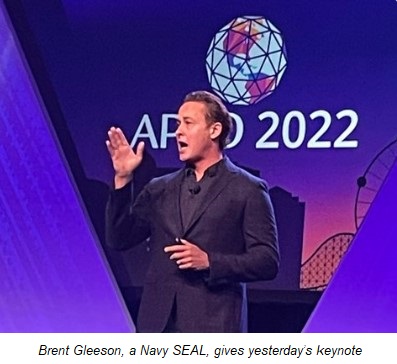The APCO Annual Conference & Expo kicked off August 7 in Anaheim and will run through Wednesday. The conference is being held in Orange County at the Anaheim Convention Center, offering four days of educational sessions, committee meetings and special events, paired with two full days of exhibits. It projects it will attract over 5,000 attendees and exhibitors.
A keynote address was delivered on Sunday entitled “Plugging It in: Where FirstNet Fits in the ECC” [emergency communications center] by FirstNet’s John Hunt. He was joined by Doug Campbell from the City of Alexandria Department of Emergency and Customer Communications in Virginia, and Stephen Devine from AT&T’s FirstNet program, who introduced the fundamentals of how FirstNet is being used in an emergency communications center.
Monday’s keynote presentation was given by Brent Gleeson, a Navy SEAL, a best-selling author, a combat veteran with multiple tours to Iraq and Africa and other theaters of war. He has become a successful entrepreneur applying lessons learned on the battlefield and his discipline as a former member of SEAL Team 5 to the world of business and writing.
Using stories of his SEAL Team experiences and his expertise in transforming businesses, Brent’s session focused on leadership and building high-performance teams, as well as cultural and organizational transformation.
On Monday, the association presented its awards. The following were acknowledged:
- Telecommunicator of the Year: Alonda Oates, Jacksonville Fire Rescue, Jacksonville, FL
- Director of the Year: Tina Buneta, Aurora 911, Aurora, CO
- Information Technologist of the Year: Kyle Boeddeker, Kitsap 911, Bremerton, OR
- Line Supervisor of the Year: Cherish Moon, Jeffcom 911, Lakewood, CO
- RF Technologist of the Year: Ron Polluconi, Washington County Consolidated Communications Agency, Beaverton, OR
- Trainer of the Year: Roger Martin, Missouri State Highway Patrol, Jefferson City, MO
- Team of the Year: Charlotte Fire Communications, Charlotte, NC
- Technology Leadership: Snohomish County 911, Everett, WA
Programs for Tuesday’s General Sessions include:
- Setting Up Durable Next Generation SOC Solutions for ECCs
- New Phase of Emergency Alerting
- Emergency Preparedness, Response & Situational Awareness
- Cybersecurity Best Practices for the PSAP: From the Floor to the CloudCyber
- Cybersecurity in Public Safety Communications
- Drones Expanding Situational Awareness in the ECCFirstNet
- FirstNet: Transforming the Future of Emergency Communications
- Human-Centered Design: What It Is, and Why it Matters When Selecting Public Safety Software
- Compliance Assessment Program: How do you ensure Interoperability?
Every year, APCO’s Government Relations Office curates the Cutting Edge Developments track for APCO’s Annual Conference and Expo. This track provides attendees with opportunities to learn about a variety of issues and technologies that impact public safety communications. This year’s Cutting Edge track features discussions on emerging technologies for 911 location, using GIS solutions for public safety and emergency response, digital tools for streamlining recruitment and hiring, and leveraging 5G and cloud-based capabilities to enhance public safety, among other topics. Subject matter experts will showcase how developments in technology can advance emergency communications center (ECC) operations and emergency response overall.
A second Cutting Edge track session will highlight the growing trend of revising mental health responses in 911. Public safety agencies are increasingly using alternative dispatch programs to respond to calls for service such as mental health crises. These programs generally entail incorporating mental health professionals and/or social services into the dispatch options, but there are several different approaches and variations to their operation. Attendees will have the opportunity to learn about mental health diversion programs from ECCs that have implemented such programs in Austin, Texas, and Washington, D.C.
One of the hottest topics this year is the potential for federal funding to support a nationwide transition to Next Generation 911 (NG911). ECCs must have sufficient resources to deploy new technologies and capabilities. Some areas are making progress, but significant federal funding is still needed according to many market analysts, to ensure comprehensive, secure, multimedia-capable and interoperable implementation and avoid a mix of “haves” and “have nots” across the country.





Reader Interactions